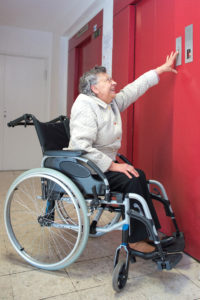Navigating ADA Regulations

In 2015, a study released by the U.S. Census Bureau stated that more than 20 million people ages 18 and older reported having serious difficulties walking or climbing stairs. This represents 7.1% of the civilian non-institutionalized population. This is a large fraction of America’s economy that may be unable to frequent your store due to architectural barriers. Because of the Americans with Disability Act (ADA), public accommodations having architectural barriers are not only against the law but are overall bad for business. Less traffic means fewer sales!
Architectural barriers are physical elements in a public or commercial facility that impede access to people with disabilities. Most people immediately think of steps and curbs as architectural barriers, but it goes deeper than that. Barriers can include any factors that obstruct the path of travel or hinder access to a facility like telephones, drinking fountains, mirrors, and paper towel dispensers. Even high pile carpeting can become inaccessible to wheelchair users. There are many design factors that able-bodied people do not consider; therefore, regulations mandated by the ADA help us ensure that facilities are readily accessible to individuals with disabilities.

Navigating the ADA regulations is tricky. Building inspectors are not required to conduct a full review of your facility for ADA noncompliance. Their main concern is whether your project meets the level of accessibility required under the applied building code relevant to the jurisdiction. Down the road, new ADA requirements may be introduced that were not previously required, making it difficult to prepare for it during the plan check. Despite this, a person has the right to sue if your space does not meet accessibility standards.
What Is the Americans with Disabilities Act?
As stated in the LA Business portal, “The Americans with Disabilities Act (ADA) is a Federal civil rights law designed to ensure equal access, full inclusion, and participation for people with disabilities or impairments.” Along with the ADA laws on the Federal level, most states have their own local disability laws, codes, and regulations. The State of California specifically has important ones that we will review.
Both Federal and States laws state that people with disabilities are entitled to equal access to public spaces such as lodging, recreation, and amusement facilities. While Federal and State laws are usually summed up as “the ADA laws,” there are crucial differences that your business needs to know in order to avoid any potential lawsuits or fines.
Federal ADA regulations assert that all new construction for public accommodations must comply with the 2010 Americans with Disabilities Act Standards. In addition to new construction, the ADA requires that existing establishments have an obligation to continue removing architectural barriers, even if your business is not contemplating construction.
The California Building Code spells out specific ways to make your business accessible but only requires that business owners make enhancements if they are going to do construction or a renovation. For example, if you renovate your building, then all new construction must comply with the accessibility standards. This may require structural updates, modernizing bathrooms, drinking fountains, etc. However, under California code, if the cost of your construction is under the state valuation threshold, you are permitted to limit the costs of your improvements outside the area of remodel to 20% of your construction costs. The CA valuation threshold changes every year so be sure to stay updated.
Like previously mentioned, city officials and building inspectors are not required to conduct a full review of your business’s accessibility deficiencies; they must only ensure that the renovations covered by your building permit meet the level of accessibility needed under the relevant building code for that project. This is important because if your business is not up to date with ADA requirements, this may lead to an expensive lawsuit in the future.

Luckily, the government does allow you a little bit of leeway for existing establishments. The improvements to an existing facility must be readily achievable and able to be completed without too much difficulty or expense. If you do not have the funds or ability to do this, you may be eligible to waive the necessary updates until you are able to accomplish them (if you can provide sound legal proof).
But, how do I know if I am ADA approved if the building inspectors won’t tell me?
Hire a professional Certified Access Specialist (CASp) who will come to your facility and evaluate the space. Upon completing their inspection, they will write up a report detailing whether you have complied with all the state and federal ADA laws. If you are not fully compliant, they will also provide the steps required to achieve full compliance. Another bonus of having a CASp inspection is that if you are sued in a state court over accessibility, you can use the CASp inspection report to enable your eligibility for a 90-day stay of the lawsuit and an Early Evaluation Conference.
Permit Advisors has a team that is heavily in knowledgeable in ADA regulations. During our plan prescreening and quality control phase of permit expediting, we review all submittal plans and documents closely for errors or missing information. If we notice an ADA compliance issue, we can point it out before submitting to the city. This will help save unnecessary re-submittals caused by small mistakes. For questions regarding permits related to ADA compliance, contact us.
SOURCES:
https://business.lacity.org/ada-compliance
https://steppingthruaccessibility.com/building-permits-accessibility-approved-or-not/
https://lodgingmagazine.com/the-accessibility-puzzle-navigating-ada-requirements/
http://www.pewresearch.org/fact-tank/2017/07/27/7-facts-about-americans-with-disabilities/
https://www.ada.gov/regs2010/2010ADAStandards/2010ADAstandards.htm
https://adata.org/ada-law-regulations-and-design-standards
https://codes.iccsafe.org/content/chapter/1780/




